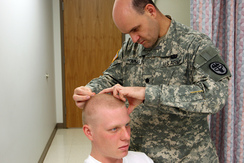 PTSD is a physiological disorder that can result from being exposed to a traumatic event. The disorder results in several different symptoms including anxiety, irritability, insomnia and flashbacks. The effects of post-traumatic stress disorder in someone’s life can be far reaching. Feelings of hopelessness, shame and despair, problems at work or with relationships, serious health problems, depression, anxiety and drug or alcohol abuse are not uncommon. Getting help can be hard at first, but can have a great impact for helping PTSD. Acupuncture, MSRP & NADA The Military Stress Recovery Project (MSRP) is a unique program that provides free community acupuncture to veterans and active duty soldiers with PTSD and their family members. Treatment in a MSRP clinic is unique for several reasons. Patients are treated in a group setting, sitting in comfortable chairs. There is an environment of calm and support. The patients are treated using the National Acupuncture Detoxification Association (NADA) protocol, a series of 5 needles placed in one ear. The program is designed to address all the needs of people with PTSD. The MSRP clinics have been very successful. Patients report stress reduction, improved mental clarity, improved energy, enhanced performance, better sleep, fewer bad dreams and headaches, less anxiety and depression, reduced anger and pain, improved general health and better relationships. Cognitive Behavioral Therapy Cognitive therapy involves talk sessions between a therapist and their client. The therapist will help the patient work through their trauma and memory and can include techniques such as exposure therapy. This type of therapy is not for everyone but has been proven effective in beginning the steps toward recovery from a traumatic experience. Relaxation methods A lot of the times, anxiety and high blood pressure come with PTSD. Practicing daily relaxation methods can help lower stress and anxiety due to PTSD. Meditation, yoga and breathing exercises can all help lower heart rate and calm the mind. Spending time in a quiet place in nature can also have calming effects. Taking the time out each day to practice mindfulness can be very beneficial in lowering PTSD symptoms. Eye Movement Desensitization and Reprocessing EMDR therapy is practiced with a trained EMDR psychotherapist and involves allowing the brain to reprocess traumatic memories. It has been shown to reduce recovery time for PTSD patients and is less likely to cause triggers from the trauma than talk therapy. The American Psychiatric Association and Department of Defense/Veteran’s Administration recognize it as an effective treatment. Guided imagery Guided imagery is a meditation therapy that can be used at home and involves listening to dialogues to help reduce anxiety, depression and other symptoms of PTSD. The recorded dialogues are listened to a few times a week and involve imagining oneself in nature and a calm environment. Want to Learn More? Interested or have questions? Or do you know someone suffering from PTSD in the Portland/Vancouver/Ridgefield/La Center areas whom you think would benefit from Acupuncture in particular? If so, please feel free to book in at All Ways Well or email us. We are happy to help in any way we can! Sources: http://bit.ly/1rSwjDe, http://bit.ly/24Y9YCE |
AuthorsRebecca M H Kitzerow is a Licensed Acupuncturist practicing in La Center, Washington. With over a decade of experience she has won 10 Nattie consumer choice awards from Natural Awakenings Magazine since 2014. Archives
July 2024
Categories
All
|
Photos from Hey Paul Studios, BeGreen_Studio, Pawel Pacholec, 1950sUnlimited, toulupaliaqaz, Joelk75, OnTask, Robert Gourley, cnu_sports, Mitya Ku, wuestenigel (CC BY 2.0), FootMassagez, 401(K) 2013, Mariana Heinz, @EdwardTerry, fishhawk, liverpoolhls, torbakhopper, Boemski, dolomitibl, Driscolltheque, Dave n Laura, Vaping360, MVWorks, Life Mental Health, MVWorks, mikefats, Scot Nelson, jfl1066, wZa HK, ruurmo, Guadalupe Cervilla, Army Medicine, GViciano, torbakhopper, adrigu, Saulo Cruz, Ben Cumming, marniejoyce, kcxd, JasonCorey, kanenas.net, Live to Create Photography, gm.esthermax, Unique Hotels Group, Zenspa1, mysiana, Tobias Lindman, Leader Nancy Pelosi, Kristoffer Trolle, swanksalot, Bill Selak, Parker Knight, stimpsonjake, Gedankensprudler, SuperFantastic, tonynetone, marniejoyce, JeepersMedia, Illusive Photography, 'Ajnagraphy', Iban Torras, scotted400, gtall1, dvanzuijlekom, BPPrice, Skley, torbakhopper, Renato Ganoza, anka.albrecht, QUOI Media, Public Domain Photos, Instant Vantage, Victor Tongdee, Free Grunge Textures - www.freestock.ca, sportEX journals, Nadja Tatar, angela n., marniejoyce, MVWorks, Karolina Kabat, Thomas Fisher Rare Book Library, UofT, ginnerobot, tracilawson, haven't the slightest, My Photo Journeys, Pierre Willemin, Florena_Presse, SuperFantastic, colindunn, zzkt, TraumaAndDissociation, ER24 EMS (Pty) Ltd., shixart1985 (CC BY 2.0), marniejoyce, Tomás Fano, freestock.ca ♡ dare to share beauty, Archives New Zealand, Jaykhuang, airdrie.m, Go-tea 郭天, OnTask, wuestenigel, focusonmore.com, Disney | ABC Television Group, Andrew Gustar, Didriks, ConstructionDealMkting, charlywkarl, barnimages.com, Lel4nd, runwaypilates, michaelstephanfotografie, McLevn, TraumaAndDissociation, eLife - the journal, Lars Plougmann, wuestenigel, shixart1985, boviate, davis.steve32, kevin dooley, @the.photoguy (insta), frederic.gombert, Feathering the Nest, Victor Tondee, shixart1985, wuestenigel, Joe K Gage, kennethkonica
 RSS Feed
RSS Feed
